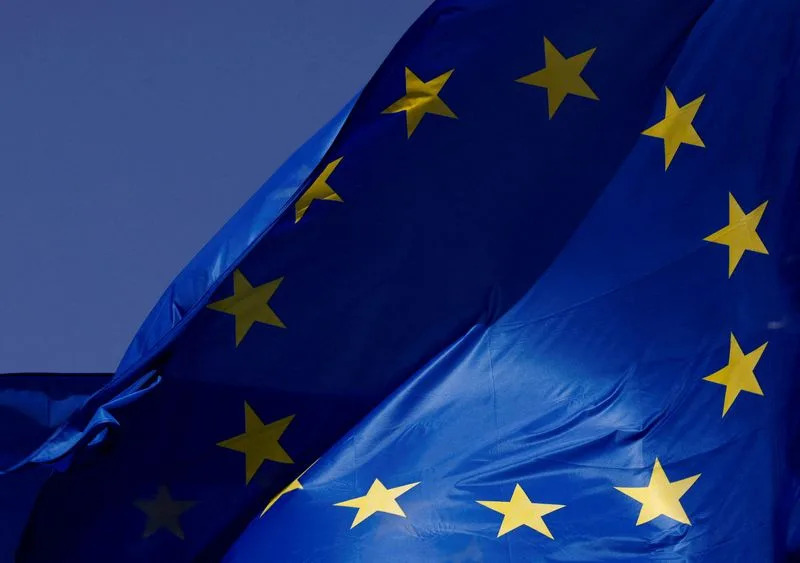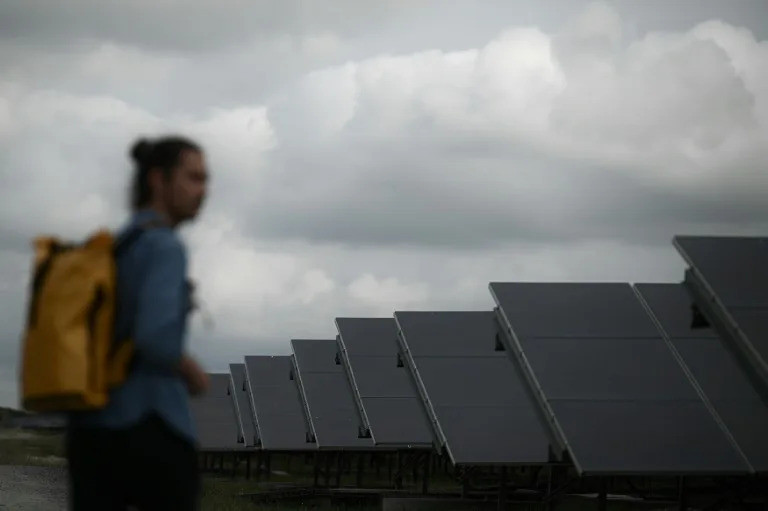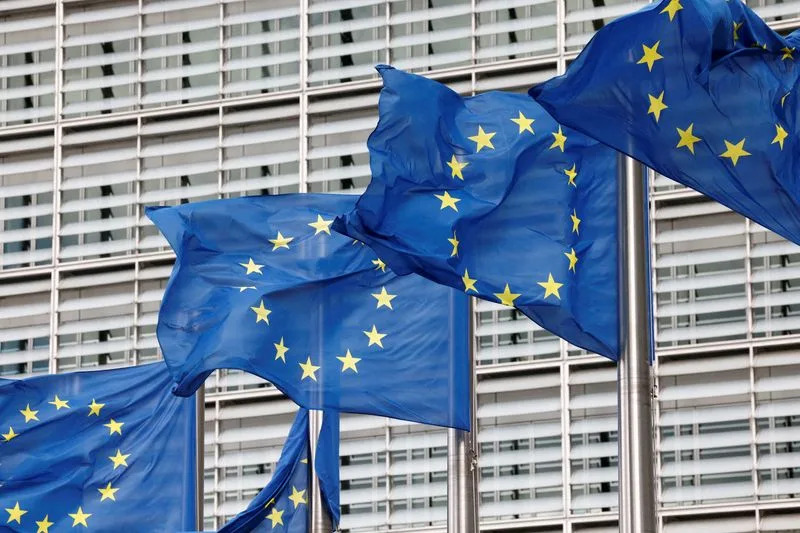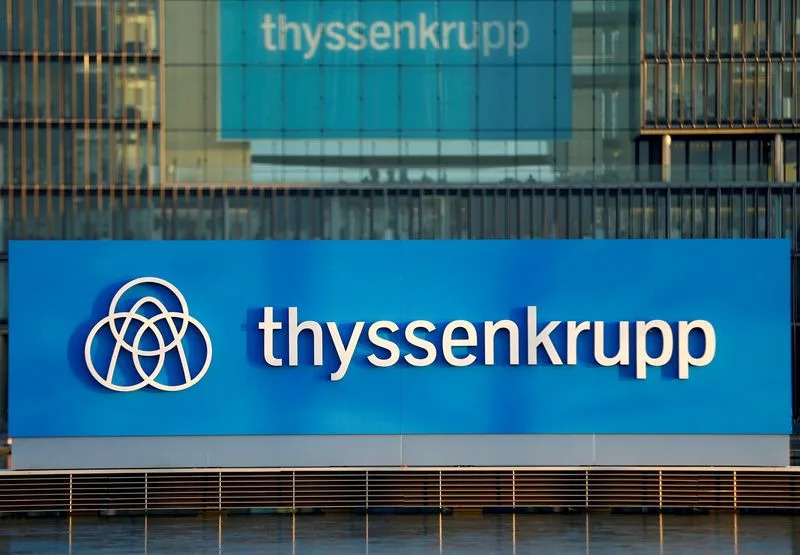EU warns of 'unfair' Chinese subsidies in Green Deal plan - draft
Mon, 30 January 2023

European Union flags flutter outside the EU Commission headquarters in Brussels
BRUSSELS (Reuters) - Europe and its partners must do more to combat the effect of Chinese subsidies for the manufacture of clean technology products, the European Commission is set to say on Wednesday in its "Green Deal Industrial Plan".
The plan is designed to outline how Europe can keep its place as a manufacturing hub for green products such as electrical vehicles and respond to multi-billion dollar subsidy programs of China and the United States.
The EU draft document seen by Reuters will insist that trade and competition on net-zero industry be fair and say that some partners' initiatives can have undesired effects.
Chinese subsidies, it says, have long been twice as high as those in the EU, relative to gross domestic product, with a pipeline of $280 billion of investments, distorting the market and ensuring China's lead in a number of technologies.
"Europe and its partners must do more to combat the effect of these unfair subsidies and prolonged market distortion," said the draft, which could still be changed before it is due to be published on Wednesday, a week from an EU leaders' meeting.
The European Commission said trade openness was an essential part of the EU strategy to ensure the bloc is a leader in net-zero technologies.
The Commission will seek to increase the EU's network of free trade agreements, build a global critical raw materials partnership and also deploy trade defence measures.
The Commission will make use of a foreign subsidies regulation that entered force this month to investigate if subsidies granted by third countries impact the EU's internal market, according to the document.
"The EU will also work with partners to identify and address distortive subsidies or unfair trading practices relating to IP theft or forced technology transfer in non-market economies, such as China," it says.
(Reporting by Philip Blenkinsop; editing by Grant McCool)
EU crafts response to US green tech subsidies
Daniel Aronssohn
Mon, 30 January 2023

The EU will present long-awaited proposals on Wednesday to counter sweeping US subsidies on green tech that threaten Europe's industry, already struggling with soaring energy prices and unfair competition from China.
Faced with member states divided between free market supporters and state aid advocates, European Commission President Ursula von der Leyen is under pressure to urgently respond to the US Inflation Reduction Act (IRA).
- Why must the EU respond? -
The United States adopted the IRA last year, lavishing subsidies and tax cuts worth $370 billion for US buyers of electric vehicles -- if they "Buy American" -- and leaving European car manufacturers aghast.
European industry has sounded the alarm over the IRA's impact on the continent, as high energy costs and US subsidies could push companies to leave.
Unlike their American counterparts, European businesses already face massive energy bills, unable to turn to cheap Russian gas after Moscow's invasion of Ukraine.
Gas prices imposed on European manufacturers have tripled compared with the average for the past decade, while gas bills have remained stable in Asia and North America.
The EU has already committed to invest hundreds of billions of euros in green tech including solar panels, batteries and hydrogen.
The bloc, however, risks becoming dependent on Chinese companies that benefit from both massive subsidies and fewer environmental constraints.
"Many companies already relocate partially or totally their production outside Europe," said BusinessEurope, the EU's main business lobby.
Thousands of jobs are at stake in the chemicals, steel and other sectors.
- What are the available options? -
Mandated in December by EU member states to develop a European response, von der Leyen seeks to ease regulatory constraints weighing on green industries.
She has already announced plans for a new law that will make it possible to support strategic European projects, by speeding up and simplifying permits and financing.
Draft proposals by the commission seen by AFP include temporary relief from state aid rules, targeted at priority sectors, as well as support for investments in factories via tax benefits.
But relaxing state aid rules is controversial. It would help the bloc's richest countries, especially France and Germany, since they could pour money into their businesses at the expense of EU competitors.
Germany and France represent respectively 53 and 24 percent of state aid notified to Brussels since March 2022 when the rules were relaxed following the war in Ukraine. Italy came in third, representing seven percent.
In a letter signed by seven countries including Austria, Denmark and Finland, they stressed that the bloc's "competitiveness and better investment environment... cannot be built on permanent or excessive non-targeted subsidies".
Some EU members including France and Italy are calling for new common funds. Von der Leyen promised to work on a new European sovereignty fund paid for by an increase in the bloc's budget.
But such a mechanism will only be possible with the support of Germany and other "frugal" northern EU members, which oppose joint borrowing or any increase to their budgetary contributions.
The EU's single market commissioner, Thierry Breton, has suggested other ways to finance the response including the mobilisation of the 800-billion-euro European recovery plan's remaining funds and loans from the European Investment Bank.
- When will the EU decide? -
EU leaders are expected to decide on von der Leyen's proposals at a summit in Brussels next week.
While there is consensus on the need to act fast, an idea for a sovereignty fund will be pushed back to later this year, according to the draft proposals, as countries including Germany, the Netherlands and Sweden oppose it.
The extent of Wednesday's package beyond easing regulatory pressures and relaxing state aid rules is uncertain.
There are real fears in Europe of a trade war with the United States, while many remain concerned about a response that violates free market principles.
The EU and the United States "have so much more to gain when we work with each other", the commission's three executive vice presidents wrote in the Financial Times on Thursday.
Valdis Dombrovskis, Frans Timmermans and Margrethe Vestager also called for "an open, thriving transatlantic marketplace" and warned of the risk to the single market of a "massive surge" in state subsidies.
Daniel Aronssohn
Mon, 30 January 2023

The EU will present long-awaited proposals on Wednesday to counter sweeping US subsidies on green tech that threaten Europe's industry, already struggling with soaring energy prices and unfair competition from China.
Faced with member states divided between free market supporters and state aid advocates, European Commission President Ursula von der Leyen is under pressure to urgently respond to the US Inflation Reduction Act (IRA).
- Why must the EU respond? -
The United States adopted the IRA last year, lavishing subsidies and tax cuts worth $370 billion for US buyers of electric vehicles -- if they "Buy American" -- and leaving European car manufacturers aghast.
European industry has sounded the alarm over the IRA's impact on the continent, as high energy costs and US subsidies could push companies to leave.
Unlike their American counterparts, European businesses already face massive energy bills, unable to turn to cheap Russian gas after Moscow's invasion of Ukraine.
Gas prices imposed on European manufacturers have tripled compared with the average for the past decade, while gas bills have remained stable in Asia and North America.
The EU has already committed to invest hundreds of billions of euros in green tech including solar panels, batteries and hydrogen.
The bloc, however, risks becoming dependent on Chinese companies that benefit from both massive subsidies and fewer environmental constraints.
"Many companies already relocate partially or totally their production outside Europe," said BusinessEurope, the EU's main business lobby.
Thousands of jobs are at stake in the chemicals, steel and other sectors.
- What are the available options? -
Mandated in December by EU member states to develop a European response, von der Leyen seeks to ease regulatory constraints weighing on green industries.
She has already announced plans for a new law that will make it possible to support strategic European projects, by speeding up and simplifying permits and financing.
Draft proposals by the commission seen by AFP include temporary relief from state aid rules, targeted at priority sectors, as well as support for investments in factories via tax benefits.
But relaxing state aid rules is controversial. It would help the bloc's richest countries, especially France and Germany, since they could pour money into their businesses at the expense of EU competitors.
Germany and France represent respectively 53 and 24 percent of state aid notified to Brussels since March 2022 when the rules were relaxed following the war in Ukraine. Italy came in third, representing seven percent.
In a letter signed by seven countries including Austria, Denmark and Finland, they stressed that the bloc's "competitiveness and better investment environment... cannot be built on permanent or excessive non-targeted subsidies".
Some EU members including France and Italy are calling for new common funds. Von der Leyen promised to work on a new European sovereignty fund paid for by an increase in the bloc's budget.
But such a mechanism will only be possible with the support of Germany and other "frugal" northern EU members, which oppose joint borrowing or any increase to their budgetary contributions.
The EU's single market commissioner, Thierry Breton, has suggested other ways to finance the response including the mobilisation of the 800-billion-euro European recovery plan's remaining funds and loans from the European Investment Bank.
- When will the EU decide? -
EU leaders are expected to decide on von der Leyen's proposals at a summit in Brussels next week.
While there is consensus on the need to act fast, an idea for a sovereignty fund will be pushed back to later this year, according to the draft proposals, as countries including Germany, the Netherlands and Sweden oppose it.
The extent of Wednesday's package beyond easing regulatory pressures and relaxing state aid rules is uncertain.
There are real fears in Europe of a trade war with the United States, while many remain concerned about a response that violates free market principles.
The EU and the United States "have so much more to gain when we work with each other", the commission's three executive vice presidents wrote in the Financial Times on Thursday.
Valdis Dombrovskis, Frans Timmermans and Margrethe Vestager also called for "an open, thriving transatlantic marketplace" and warned of the risk to the single market of a "massive surge" in state subsidies.
EU recovers appetite for trade in green industry push

European Union flags flutter outside the EU Commission headquarters in Brussels
Mon, 30 January 2023
By Philip Blenkinsop
BRUSSELS (Reuters) - The European Union is aiming to enact up to five trade deals in record time to ensure its future as a clean tech leader, by securing supplies of key raw materials, increasing markets for green exports and reducing its reliance on China.
A big EU trade push is a key part of its "Green Deal Industrial Plan" to ensure the bloc remains a manufacturing hub able to compete with the likes of the United States, whose new green subsidies law has concerned many in Europe.
European Commission President Ursula von der Leyen will present the plan on Wednesday.
Trade Commissioner Valdis Dombrovskis said multiple economic shocks, including the COVID-19 pandemic, Russia's invasion of Ukraine and increased protectionist tendencies, had sparked an EU-wide debate about competitiveness.
"This debate has evolved into a wider reflection on whether the EU should remain outward-looking or turn further inward," he told lawmakers, adding he believed the bloc drew its strength from being a "trading superpower".
A year ago, EU diplomats said France, which then held the six-month rotating presidency of the EU, halted moves to progress trade deals lest concerns about globalisation disturb its presidential and legislative elections.
Open trade advocates Sweden and Spain, the current and next EU presidency holders, both hope to revive the trade push.
Together, the five deals being targeted could be worth about 10 billion euros ($10.9 billion) to the EU and help cement its market share and influence in the Americas and Asia-Pacific region, according to Hosuk Lee-Makiyama, director of trade think tank ECIPE.
Andre Sapir, a senior fellow at the Bruegel think tank, said the EU's free trade agreements often came in waves, with more protectionist periods in between.
"Geopolitical developments and access to raw materials are providing the extra impetus now," he said.
LITHIUM LEADERS CHILE, AUSTRALIA
Von der Leyen has said Europe needs to build up its own refining of raw materials and work with partners including the United States to strengthen supply chains and reduce dependence on China, which dominates rare earth and lithium processing.
The U.S. Inflation Reduction Act, which seeks to make the United States a leader in green technology, possibly at Europe's expense, has intensified this need.
The Commission, which negotiates trade agreements on behalf of the 27 EU members, highlights that an updated deal with Chile it agreed in December could give Europe better access to lithium, a key component of vehicle batteries.
Chile is the world's second-largest lithium producer.
The EU sees similar promise from another trade agreement with Australia, the largest lithium producer, which both sides believe could be concluded mid-year.
LATIN AMERICA OPENINGS
The EU executive has negotiated a number of trade deals, but the process of approving them has been painfully slow.
The bloc's most recently implemented trade agreements, with Singapore and Vietnam, took four to five years to clear the European Parliament and EU governments, although the fast-tracked EU-Japan accord took 18 months.
Agreements with Mexico from 2018 and with the Mercosur bloc of Argentina, Brazil, Paraguay and Uruguay from 2019 are on hold.
Now, the European Parliament and EU governments may approve as early as mid-year a deal struck only in June 2022 with New Zealand and follow that up with a green light for the Chile agreement, EU officials say.
Consent could follow for the 2018 agreement with Mexico, assuming Mexico accepts splitting the deal in two, part of which could be fast-tracked in Brussels. The planned Australia deal could also be pushed through if it is agreed by mid-2023.
"Finalising the free trade agreements, broadening our network of free trade agreements is going to be high on our agenda this year and next," Dombrovskis told a briefing earlier this month.
The Commission, which negotiates trade agreements for the 27 EU members, said Luiz Inacio Lula's defeat of Jose Bolsanaro in October's Brazilian presidential election had created a window of opportunity to revisit the Mercosur agreement.
"We cannot miss the chance with Lula," a senior Spanish diplomat said.
The deal has been on hold due to EU concerns about Amazon deforestation and demands for sustainability commitments. Lula has vowed to tackle rainforest deforestation, but trade analysts say reviving the EU-Mercosur deal will still require tough negotiations.
"It was certainly impossible for the EU with Bolsanaro, but it's also complicated now for the Mercosur side," Sapir said.
($1 = 0.9184 euros)
(Reporting by Philip Blenkinsop; Editing by Catherine Evans)
Germany's Thyssenkrupp says Europe must match U.S. climate package
Mon, 30 January 2023

A logo of Thyssenkrupp AG is pictured at the company's headquarters in Essen
FRANKFURT (Reuters) - German conglomerate Thyssenkrupp on Monday joined peers in saying that European industry was under threat should the continent fail to come up with a scheme similar to the U.S. climate package to boost local companies.
"The common task of policymakers, business and society must ... be to ensure that the green transformation succeeds without deindustrialization," Chief Executive Martina Merz said in a prepared speech published ahead of the group's annual general meeting on Friday.
She said that was particularly the case for Germany with its industrial base, including steel, cement and chemicals makers, that have all suffered from higher energy costs, driving inflation at a time when they need to decarbonise production.
That has stoked fears of European companies shutting or moving production to regions where costs are lower, compounded by the $430 billion U.S. Inflation Reduction Act (IRA) to support clean technologies via tax credits.
The European Union responded this month saying it will prepare a law to make life easier for its green industry and back it up with state aid and a sovereignty fund to keep firms from moving to the United States.
"That's good, because tomorrow's markets are being carved up now," Merz said, adding that a planned spin-off of Thyssenkrupp's steel division still required more clarity in terms of subsidies as well as energy and raw materials prices.
(Reporting by Christoph Steitz, Editing by Miranda Murray and Christina Fincher)
Mon, 30 January 2023

A logo of Thyssenkrupp AG is pictured at the company's headquarters in Essen
FRANKFURT (Reuters) - German conglomerate Thyssenkrupp on Monday joined peers in saying that European industry was under threat should the continent fail to come up with a scheme similar to the U.S. climate package to boost local companies.
"The common task of policymakers, business and society must ... be to ensure that the green transformation succeeds without deindustrialization," Chief Executive Martina Merz said in a prepared speech published ahead of the group's annual general meeting on Friday.
She said that was particularly the case for Germany with its industrial base, including steel, cement and chemicals makers, that have all suffered from higher energy costs, driving inflation at a time when they need to decarbonise production.
That has stoked fears of European companies shutting or moving production to regions where costs are lower, compounded by the $430 billion U.S. Inflation Reduction Act (IRA) to support clean technologies via tax credits.
The European Union responded this month saying it will prepare a law to make life easier for its green industry and back it up with state aid and a sovereignty fund to keep firms from moving to the United States.
"That's good, because tomorrow's markets are being carved up now," Merz said, adding that a planned spin-off of Thyssenkrupp's steel division still required more clarity in terms of subsidies as well as energy and raw materials prices.
(Reporting by Christoph Steitz, Editing by Miranda Murray and Christina Fincher)
No comments:
Post a Comment